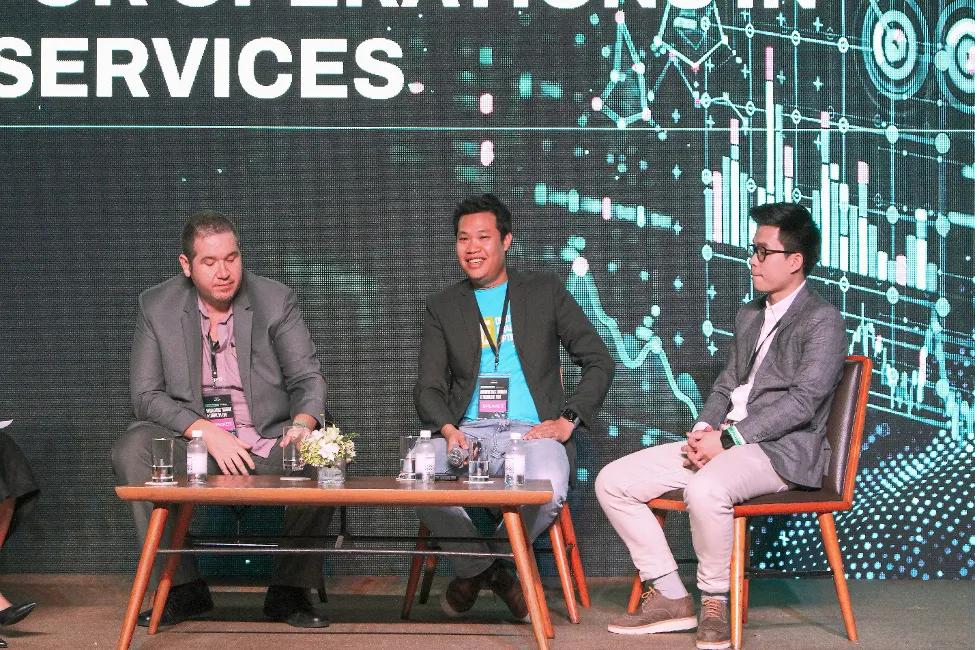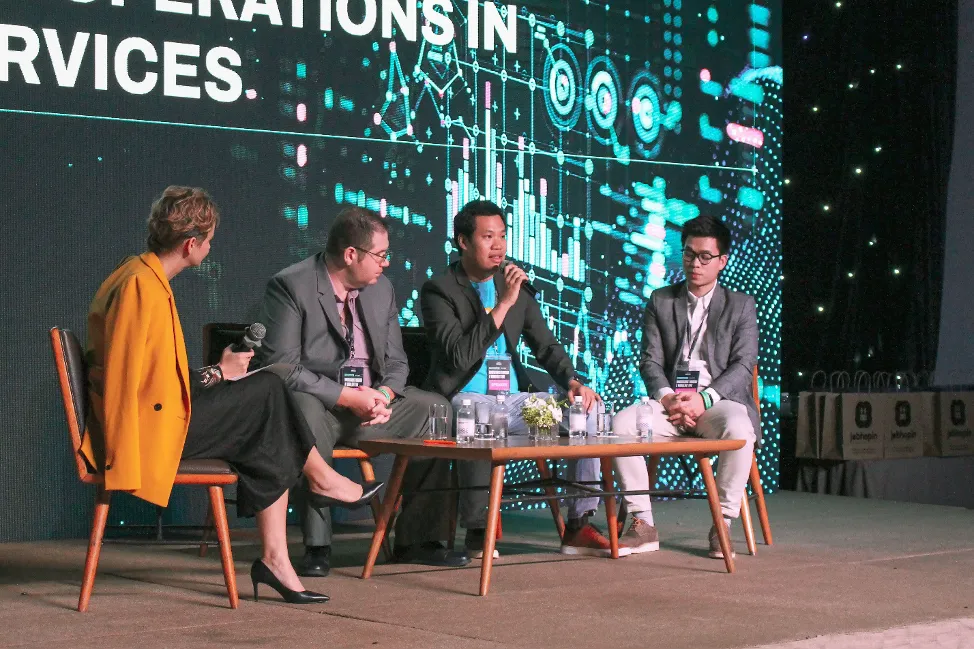
Nguyen Minh Thoai, CEO of DIGI-TEXX, last weekend shared his insight at Finovate : Product Day 2 - a Jobhoppin’s event themed “Digitalisation and Automation strategy for operations in financial services” in Ho Chi Minh City.
“Finovate: Product Day 2” event shredded lights on how organisations of all industries navigated through uncertainties amidst this period of of hyper-turbulence and change.
Businesses that highlight and successfully optimise automation process at the centre of their transformations will have a competitive advantage through complexity.
In the midst of economic unpredictability, the memory of an organization will be determined by how successfully it transforms itself and its personnel in the present day.
There’s no doubt that automation could yield significant benefits for all kinds of sectors, from financial services, healthcare services, e-commerce, real estate, to name a few. Robotic Process Automation (RPA) could relieve humans from repetitive hazardous and unpleasant tasks.
“Organisations across the globe are increasingly relying on RPA to carry out routine, rule-based operations. Notwithstanding, many businesses are just at the very beginning of their automation journey, and have yet to realise RPA's full potential,” Thoai said.
Caption: Nguyen Minh Thoai, CEO of DIGI-TEXX, offered his thoughts at Finovate : Product Day 2 themed "Digitalisation and Automation strategy for operations in financial services".
However, in terms of automation’s disadvantages, he added, the high initial cost and investment of an automated system and the greater level of maintenance required would also work against automated processes.
“Obviously, when we are talking about investment, there's just mentioned about a different level of automation in an organisation and how much you will invest to reach that level. But in fact, it is not only money to buy the tech – it’s a lot of other things as cost involved such as human resources, technology and process, knowledge & strategy to collect data, manage data, to name a few,” Thoai said.
“From our experience, automation is not an easy task – it also requires a very high level of accuracy in data. For instance, when a customer submits their documents for health insurance claims, the submitted documents or information would be written out automatically without any human intervention regardless it’s a handwritten form or printed documents or input data. But, how do you know these documents are accurately processed by the Machine? Automation system is also associated with a scoring system, where you can track data points, decision points so they can be processed straight through based on business rules, logic, common rules and confidence level of combined data,” he shared.
 |
Thoai also drew an example of automation in the healthcare industry, and he believed that leveraging and collecting more data could generate more accurate information, thus enabling better outcomes. He also believed that ChatGPT, an AI tool with advanced NLP (Natural Languages Processing) can enable businesses to improve automated quality control proceduresforswift decision-making and help businesses to streamline internal processes and less depend on human resources.
According to the 2022 McKinsey Global Industrial Robotics Survey, automated systems will account for 25 per cent of capital spending over the next five years. Particularly, industrial-company executives expect to see benefits in output quality, efficiency, and uptime. However, many remain wary of the challenge, with the hardware cost and a lack of internal experience at the top of their list of concerns.
Among the industrial sectors surveyed, the biggest spender on automation over the next five years is set to be retail and consumer goods, with 23 percent of respondents from that sector planning to spend more than $500 million. That compares with 15 per cent in food and beverage and 8 per cent in automotive. For logistics and fulfilment players, automation will represent 30 per cent or more of their capital spending in the next five years—the highest share among industrial segments surveyed.
Thoai also highlighted the vast potential of the Vietnamese fintech landscape, citing that Vietnam is among the top 3 countries besides Indonesia and the Philippines to adopt new technologies such as fintech and metaverse, according to a report by Meta and Bain & Company.
 |
Seven out of 10 digital consumers in Vietnam have used the technology of the metaverse (cryptocurrency, augmented reality/virtual reality, virtual world, and NFT) in 2022. In particular, Vietnam has the highest rate of virtual reality adoption among Southeast Asian countries with 29 per cent.
The report also indicated that 58 per cent of digital consumers in Vietnam will have used fintech solutions (online banking, e-wallets, money transfer apps, omnipotent digital banking) in 2022.
Additionally, according to Robocash, Vietnam's fintech market has the second fastest growth rate in the region, after Singapore with revenue expected to reach $18 billion by 2024.
“However, as fintech is growing its popularity, we acknowledge that the backend process outsourcing services still offer lucrative opportunities for the Vietnamese tech sector. That’s why DIGI-TEXX Vietnam is tapping into this segment. While 80 percent of our revenue comes from international markets such as the EU, the US, and Japan, we are also strengthening our footprint in Vietnam, as we see great promise in the country’s young, digital-savvy population,” Thoai noted.




















